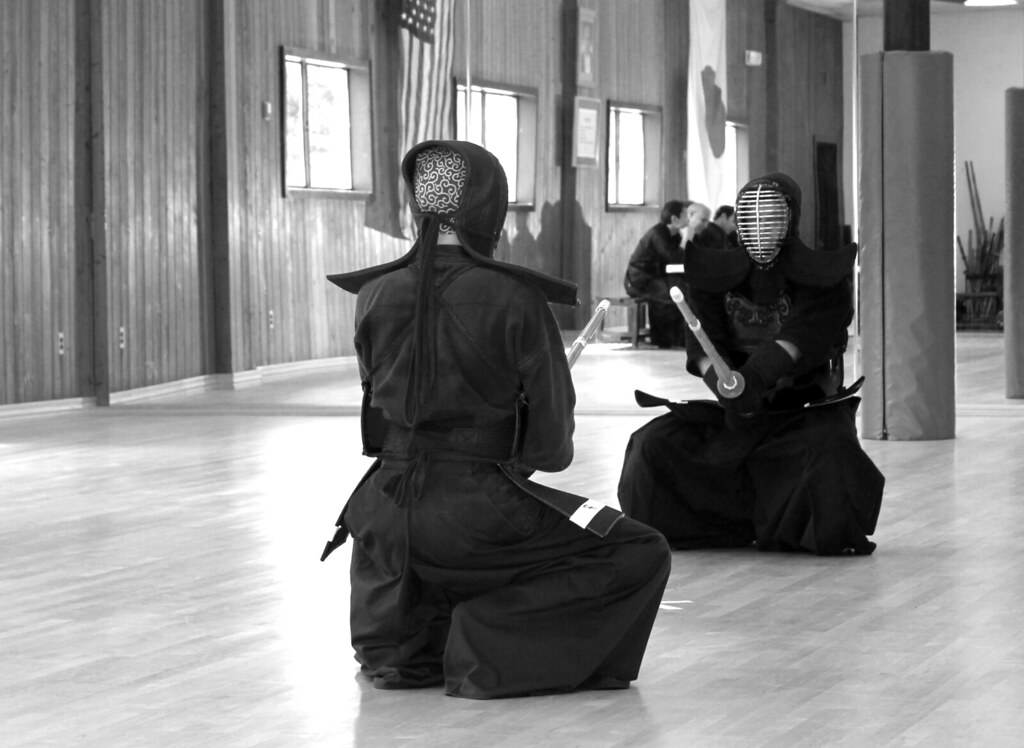Here is the last post, unfashionably late, in my "Communication and Kendo" series.
I tied communication to the art of kendo in Part 1 by talking about kendo and self-improvement. Then
I introduced the idea of "Ki Ken Tai Ichi" as the second point that brings kendo and communication together. Now I want to tie in the final point of kendo - respect yourself and others. Showing respect equates to understanding who we are in relation to others.
 |
| Photo taken by David P. |
Kendo is a difficult martial art to understand because it doesn't teach you useful ways to defend yourself, unless you plan to carry your bamboo sword everywhere with you. Unlike hand-to-hand martial arts such as karate or aikido, kendo keeps you at a distance from your opponent, so while the goal is to hit first (and hit correctly) you do not make any contact with your opponent except with a sword. So what's the point?
Well, the point is you learn to "size up" your opponent. You measure him or her by judging size, reach, skill, and speed. When facing an opponent, it may take a few passes and feints before you get a feel for who you are up against. Then, you attack accordingly. The more experienced you are, the better your chances of correctly "sizing up" your opponent and taking the first strike. Rarely will you see an experienced kendoka (person who practices kendo) jump right into an attack in the first few seconds.
We "size up" other people every day. Salespeople size up their customers. Lawyers size up their clients. Managers size up employees. We size up people we've never met like people walking the mall, sitting on the train, or standing in line at the grocery store. When we have little experience with someone, our limited knowledge can cause us to size others up too quickly. That man on the bike with a turban on his head? He must be a terrorist. That woman in the gorgeous but revealing red dress standing on the sidewalk? She must be promiscuous. That kid on a skateboard going down the sidewalk during school hours? He must be a slacker or dropout. That old man sleeping in the seat ahead of you on the bus at 11:00 at night? Must be homeless.
Quick judgments often lead to bad assumptions. It can reveal a lack of respect one has for others and even for one's self. Everyone is different: different appearance, different talents, different beliefs, different needs. Being quick to size up someone means many of those differences were not taken into account, and incorrectly judging another person can have a negative impact in many cases. That turban-wearing terrorist is a
peaceful Sikh who is not ashamed of his beliefs even in the face of persecution. The woman in red is waiting patiently to have a romantic dinner with her husband of ten years. The kid on a skateboard is homeschooled because his school's curriculum isn't challenging enough. And the old man is sleeping because he just got off an evening shift he has to work because he doesn't have enough money to retire.
 |
| Image from Bellevue Schools Foundation |
Teachers like to "size up" their students. Teachers that my son has had in the past sized him up by past behaviors and what others said about him. His best teacher was the one who took the past into consideration, asked questions of him, me, and other staff who interact with him, and then said, "Let's try this," until something stuck. The later kind of teacher is the kendoist who doesn't take their opponent for granted. Underneath the defensive and non-compliant student is a wily kid with a knack for spatial understanding. But who knew? He was just the "trouble maker." Well, his excellent teacher knew. And what a difference in his learning it made. My son now has a respect for learning, and respects himself more as a learner.
In order to be successful, kendoka must learn to respect their opponent, to quickly but meticulously learn their opponent's strengths and weaknesses. A good kendoka does not run headlong into an attack without knowing who he or she is up against. Neither should we run headlong into judgement about others without determining the individual's personality and drives. As in kendo, we must carefully "size up" the people we interact with because it is the respectful thing to do. That person could become your greatest adversary, a fountain of knowledge, or your most trusted friend. You wouldn't know without first understanding who they are. And to understand them, we must do the dance, giving each other the right amount of space, the right amount of "sizing up."
 |
| Image by Jeffery Austin White |




No comments:
Post a Comment